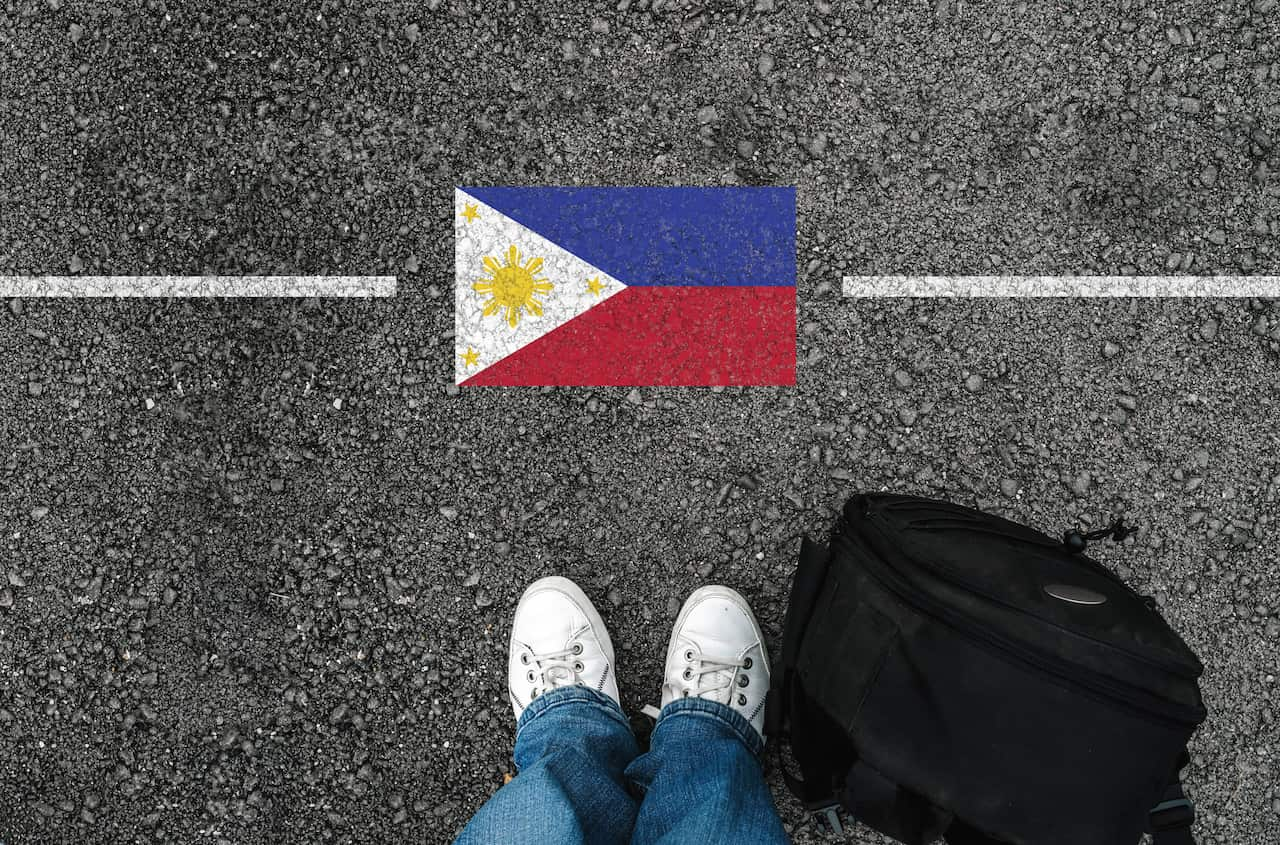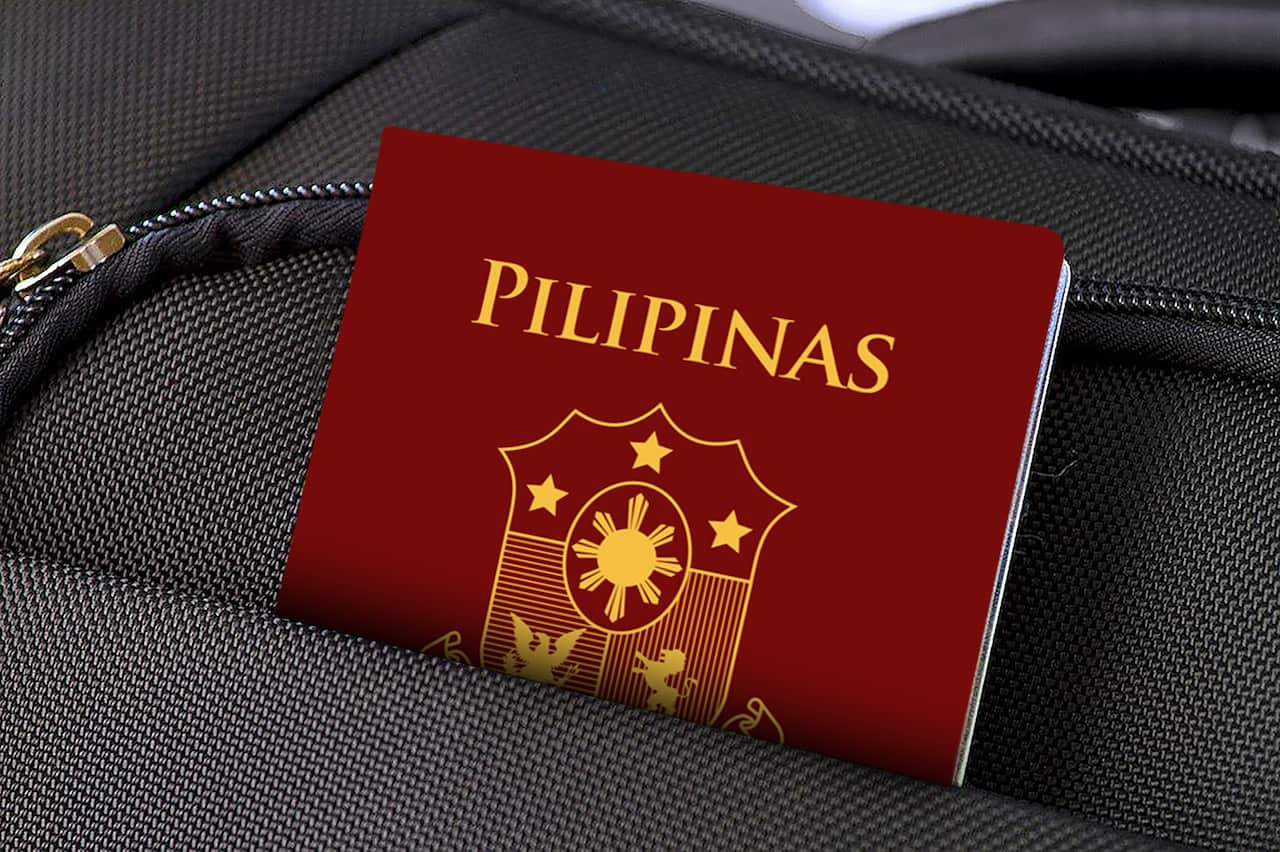The Philippines ranked third among countries with the most number of people who acquired Australian Citizenship via conferral from July 1, 2018 to June 30, 2019.
But some oath takers don't want to be treated as a foreigner when visiting the Philippines. They reinstate the Filipino citizenship and chose to become a dual citizen.
Through the provision of the Philippine law Republic Act No. 9225, a natural-born Filipino who lost her/his Filipino citizenship through naturalization in Australia may re-acquire Filipino citizenship by taking the Philippine Oath of Allegiance before a duly authorized Philippine official. The Philippine Oath of Allegiance does not require the renunciation of citizenship in any other country.
For those wanting to hold two nationalities, here are some pros, cons and obligations you may want to consider. Pros
Pros

a man with a shoes and backpack is standing on asphalt next to flag of Philippines and border Source: iStockphoto
The rules regarding dual citizenship vary from country to country but it has clear advantages in a global landscape.
1. Political and Social Rights
Dual citizens enjoy the full civil and political rights of Filipinos as guaranteed by the Philippine Constitution and existing Philippine laws.
Major advantages of being a Filipino-Australian is having access to two social service systems and the right to vote in either country.
Those who intend to vote in local elections, however, must establish residency in the locality where they wish to vote. It’s compulsory in Australia for citizens over 18 to vote in local, state and federal government elections and referendums. You can get a fine of up to $180 if you don’t show up to vote on polling day.
2. Property Ownership
Having the ability to own a property in either country means you can easily live, work, and retire in both. Dual citizens have the right to own land and property in the Philippines, engage in business or commerce as a Filipino.
Sherwin, an Australian citizen is planning to reinstate his Filipino citizenship after considering some benefits and privileges.
"It guarantees the right of entry to both countries and may karapatan ka rin bumili ng properties sa parehong bansa. kase naiisip ko, who knows kapag nagretire ako atleast may dalawa akong option na mag-aaruga sa akin either Australia or Philippines. Kung sa Pilipinas man, kapag bata bata pa eh mas madaling mag negosyo kapag ikaw eh Filipino citizen."
3. Two Passports

Philippine and Australian passports Source: SBS
International travel can be much easier for dual citizens. They have the right to travel bearing a Filipino and Australian passport.
Australian passport holders are granted visa-free entry to 180 countries, which puts the Aussie item in ninth place on the list of the world's most accepted passports. Having two passports gives more flexibility with overseas travel, work, residency and inheritance.
Australian Government requires dual citizens to use the passport used when applying for a visa for both entering and leaving Australia.
"Kapag pupunta ka ng Pilipinas pwede mong gamitin yung Philippine passport mo and basically it will eliminate the need for a long stay visa and kung gusto mo magtagal ng more than one year at the same time mai-eliminate din yung questioning ng stay mo."
4. Cultural Immersion
Dual citizens reap the benefits of being immersed in the culture of the two countries. Perhaps the best upside is the satisfaction of learning about the history of countries, a new language and a different way of life Cons
Cons

Philippine Embassy in Australiais planning another Consular misison in Brisbane before the year ends Source: iStockphoto
Having dual citizenship is great, but it is not all roses and candy. As a dual citizen, you are bound by the laws of both countries.
1.Dual Obligations
For Filipino-Australians, Philippine dual citizenship does not affect in any way the conditions or status of their Australian citizenship. However, persons who hold an elected office or are seeking an elected position might be required by their political party to renounce any non-Australian citizenship.
2. Dual tax
Dual tax obligations could also be one of the cons of dual citizenship. The Philippines and Australia have a bilateral Agreement on the Avoidance of Double Taxation. The Philippine Government will tax the individual for income generated and assets held in the Philippines. The Australian Government will tax the individual for income generated and assets held in Australia.
3. Consular Service Limitations
Assistance for dual citizens is limited in some circumstances, according to Consular Services Charter.
For example, if you enter the Philippines with your Philippine passport, local authorities may not recognise you as Australian. This can happen even if the country recognizes dual nationality. This can limit the Australian government’s ability to provide you with consular assistance. This may include government-assisted evacuations in the event of a crisis overseas.
4. Lengthy Process
One final disadvantage of dual citizenship is the process itself. The processing fee is only $90 but the Philippine Embassy in Canberra is requiring the numerous personally or by postal service for dual citizenship application.
The application process has been a decisive factor for Raul, an Australian Citizen. He dropped his dual citizenship applications after learning about the documentary requirements from the Philippine Consulate.
" Nung 2008 at nakuha ko ang Citizenship ko sa Australia, pumunta ako dun sa Philippine Consulate para mag apply ng dual citizenship. Ang nakakalungkot lang, nung nandun ako aba eh napakaraming proseso pa pala para maging dual citizen ka."
"Gusto pa akong kumuha ng NBI clearance, gusto pang kumuha ako ng birth certificate, police clearance at kelangan meron daw akong voters ID."
"Yun bang Philippine passport ko hndi pa ba sapat yun para sa aking birth certificate? So yung mga bagay na yun, na-turn off ako para kumuha ng dual citizenship."
Petitioners residing outside of New South Wales who lodged their dual citizenship application with the Philippine Consulate in Sydney must travel to Sydney for their taking an oath of re-acquisition of Philippine citizenship. When will your citizenship get revoked?
When will your citizenship get revoked?

Cute Australian boy with flag tattoo on his face on Asutralia Day celebration in Adelaide Source: iStockphoto
There are various dual citizens’ cases in which Australian Citizenship has been stripped.
The Minister for Home Affairs has the power to revoke someone's citizenship in case it is proven that a citizen has, for example, provided misleading information as part of their citizenship application or failed to disclose a serious criminal conviction.
Only dual citizens are at risk of losing their Australian citizenship as Australia does not allow someone to become stateless.
Under section 35 of the Australian Citizenship Act 2007, a dual national’s Australian citizenship will automatically cease if they act contrary to their allegiance to Australia, by engaging in terrorism-related conduct, or if they fight for, or are in the service of, a declared terrorist organisation overseas, according to the DHA.
The Consulate General encourages applicants to review all information provided by the Department of State, or seek professional legal advice from a qualified immigration attorney to enable you to make the most informed decision regarding the potential acquisition of another nationality.
ALSO LISTEN TO

